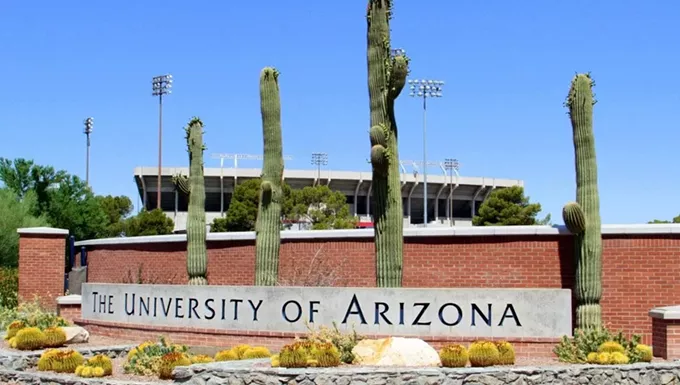Dozens of official actions have been taken against students who violated COVID-19 safety precautions and hosted social gatherings off-campus.
The university and the Tucson Police Department administered 20 red tags, 19 citations and 24 Code of Conduct violations over the weekend for student parties, according to UA President Robert C. Robbins, who shared the numbers during a press conference this morning.
Robbins and other university leaders point to this behavior as the reason COVID-19 is spreading among the community, not the essential in-person classes that are currently taking place.
Robbins described a party he witnessed last weekend that drew more than 300 college students. He said the gathering was dispersed and student sanctions resulted from the incident.
“This kind of behavior will negatively affect everyone,” he said.
Beginning in late August, the university has been tracking a gradual increase in COVID-19 prevalence among students. Robbins reported 79 new cases from 1,300 tests performed this past week, which puts them at a 6.1 percent positivity rate.
Over the previous 10 days, the university had a 11 percent positivity rate. When the state of Arizona went into lockdown at the beginning of the pandemic, there was a 10 percent positivity rate in testing.
While the drop to 6.1 percent is a noticeable improvement, Robbins said the university needs to stick with their heavy-handed mitigation strategy. The university will remain in an “only essential classes in person” phase for this upcoming week, which brings about 5,000 students to the campus for a traditional in-person learning experience.
Last week the university administration established a recommended 14-day quarantine for students living on and off campus within a specific geographical boundary. This was done in response to the uptick in new COVID-19 cases at the beginning of the semester.
The quarantine was applied to all students living between Sixth Avenue to the west, Campbell Avenue to the east, 10th Street to the south and Helen Street to the north.
Robbins said during the press conference that he believes the recommended quarantine is the cause of their decrease in COVID-19 cases over the past few days. He said the university and the local police will continue to respond to reports of student parties and some students will be expelled as a result of their actions.
“We’ve gone from begging, encouraging, now into the action phase where your choices will have consequences, and there will be individuals who are asked to leave the university," Robbins said. "It's that simple."
Reentry Task Force Director Dr. Richard Carmona said student social behavior is the “Achilles’ heel” of the university’s COVID-19 mitigation strategy. He believes the university's COVID-19 Ambassador Team (a group of paid students who encourage compliance of COVID-19 safety measures in and around the university) will be crucial for changing social standards around COVID-19 and protecting public health.
Brendan Duffy, a university student and member of the COVID-19 Ambassador Team, joined the press conference to give a report on their efforts. He said when they first started their work at the beginning of the semester, it was a daunting task to go around campus reminding their peers to wear face masks and stay physically distant.
But in more recent days, he said it is hard to find a person on University Boulevard not wearing a face mask. Duffy reported their team has started to help support the different testing operations around campus, and this week they will have a call center available to answer COVID-19 related questions from students, faculty and staff.
Duffy said their team consists of about 25 to 30 students, and they are currently recruiting more.
Robbins briefly mentioned a plan to test every student every day by January 2021, so that social gatherings, sports games and other activities can resume. He said it will be expensive to do that many tests, but the university is currently planning for that possibility in the spring.
For more information about the university’s COVID-19 response, visit covid19.arizona.edu/dashboard.


